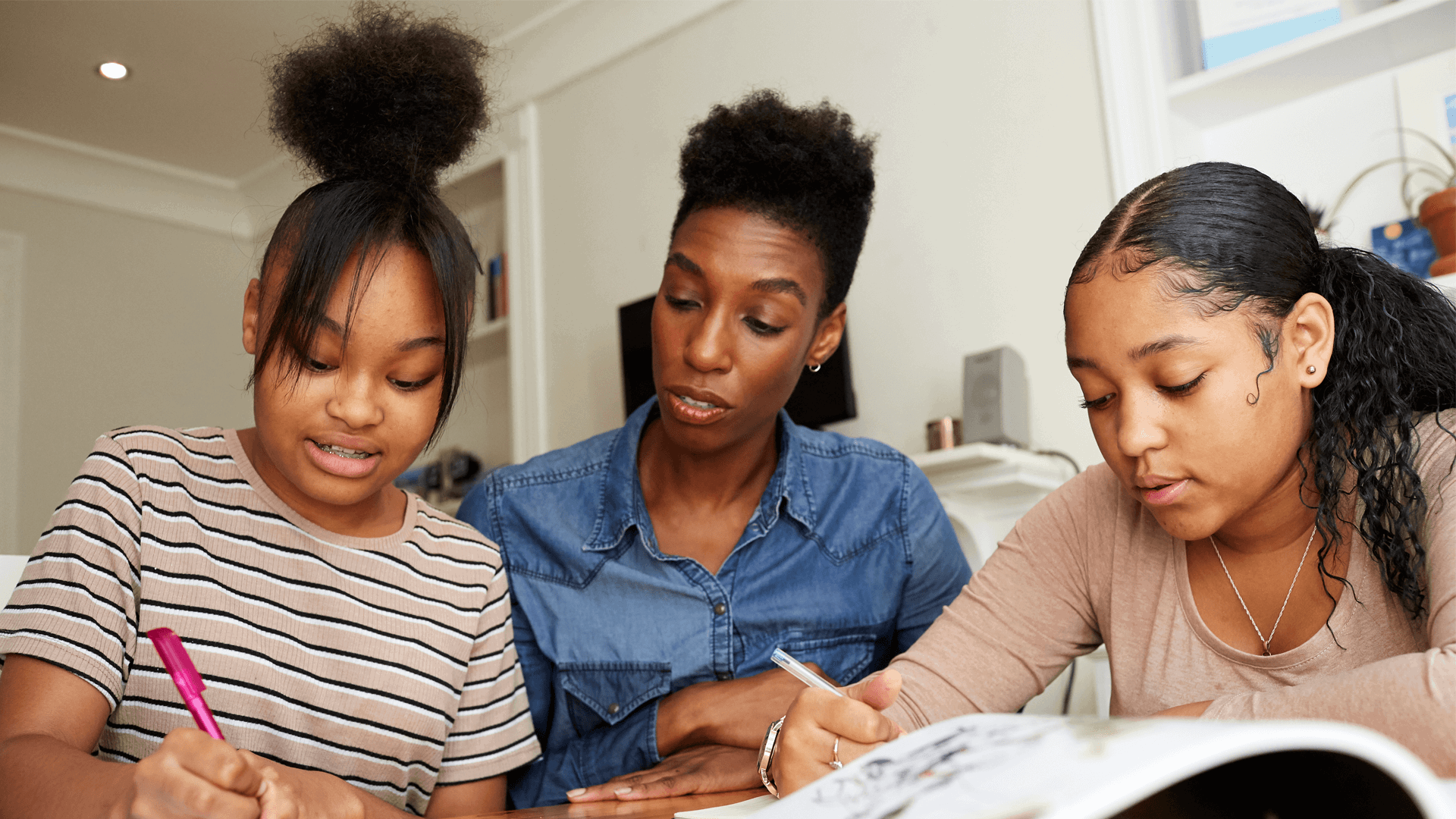My child needs urgent help
If your child is in a mental health crisis or you are worried they are not safe, read our information about accessing emergency and urgent help.
If your child is struggling with their mental health and they need some help, you may be feeling really worried as a parent – and also like you’re not sure where to start. Remember that you and your child are not alone. On this page you can find the services, professionals and organisations that can help you, and information about how to access them.
Trying to find the right help for your child and finding your way around different services can be really tiring at times. Remember to look after yourself as you go – reminding yourself that you’re doing your best and it’s not always easy.
If your child is in a mental health crisis or you are worried they are not safe, read our information about accessing emergency and urgent help.
It can sometimes be difficult to find out what support is available in your local area, or to know how to talk to professionals about what’s going on for your child.
Parents in similar situations have found that these four things can help:
Before speaking to a professional, make a note of your concerns and the times you have noticed particularly worrying behaviours or feelings. An easy way to do this is by making a list on your phone. Take this with you to appointments to give the professional a clear sense of your child’s situation, and to support any requests for referrals.
Where possible, follow up by email after appointments to confirm what’s been agreed – for example with teachers or other staff at your child’s school. Then check-in a week or two later to find out what’s happened. This is a good way to keep things moving.
If your child is on a waiting list for help, for example from CAMHS, find out whether there are other local services, such as counselling organisations, that can provide support in the meantime. Or, see if your child would like to access some immediate support from an online organisation. Take a look at some online services and helplines available to your child.
As you find your way around local services, try talking to other parents who have been through this, or speak to any friends or family who might be able to advise you about where to get started. For example, if you know anyone who works in mental health support, they might have a good idea about what’s available locally.
I spoke to other parents and those who worked in mental health. I asked them what help they thought I needed. It’s always good to open the conversation up and talk to other parents and mental health professionals.

A GP is a doctor who provides overall care for your child’s physical and mental health.
If your child is experiencing thoughts, feelings or behaviours that are affecting their daily life, speaking to a GP is a good first step to finding the help they need.
Among other things, the GP can:
You can find out more about getting support from GPs, including how to help your child get to an appointment if they are finding it difficult, in our guide.
CAMHS, also known as Children and Young People’s Mental Health Services (CYPMHS), is the NHS service for children and young people’s mental health.
Through CAMHS, your child can access specialist support and treatment such as counselling and therapy, medication, treatment for specific conditions such as eating disorders, and staying in hospital.
Some CAMHS can also diagnose neurodevelopmental conditions such as autism and ADHD, although in some areas this is done through a separate NHS paediatric team.
Each local area has its own CAMHS team, which is run by your local NHS trust. This means each CAMHS around the country is slightly different and waiting times can vary between different areas.
For more information about how your child can access your local CAMHS, including referrals and assessments, have a look at our guide.
Counselling and therapy (sometimes called ‘psychotherapy’) are both types of talking therapy that involve talking about feelings, thoughts and experiences.
Counselling and therapy can help your child to make sense of what’s going on and find ways of coping when things are difficult. Your child may be able to access free or low-cost counselling through a local organisation, even if they have not been referred by a GP or are not being treated by CAMHS. There are also private counsellors and therapists working all over the country if this is an affordable option for you.
Take a look at our guide for more information about how counselling works and the different ways your child can access it.
Therapy helped me to gain a better understanding about how I was feeling and it allowed me to learn how to cope with my emotions without getting overwhelmed by them.
Many schools and colleges offer free counselling services to their students. If this is not an option, your child's school may be able to provide emotional support through the pastoral team, or through a peer buddy or professional mentor. Schools can also refer your child to other services that offer more help. This includes the NHS service for young people's mental health, known as CAMHS. Speak to any member of staff at your child's school to find out what's available.
If your child is feeling anxious about school, have a look at our guide to find out what support schools can offer, including around Special Educational Needs (SEN).
If your child is at university, they can access help through the university's support services. This usually includes a free counselling service for students, which most universities provide.
You can find more information and advice about finding help at university in our guide for parents and carers.
Early help is provided by your local authority, and may include support from professionals such as mental health nurses, health visitors, psychologists, social workers and family support workers.
Early help practitioners will work with you to identify what your family needs and put support in place to stop things getting worse.
Through early help you may be able to access things like:
To find out more about how early help works and how you can access it, have a look at our guide for parents.

Our early help contact built a relationship with the whole family over time, so they had a good understanding of our family's needs and could really advocate for us.
You may need to find legal help or advocacy support because you are:
At times, understanding your own or your child’s legal rights, and navigating different types of services, can feel overwhelming. If you need some help, we've got a list of organisations below that you can contact. They can support you to work out the best next step.
Advocates are independent, trained support workers who can help your child to understand their rights, express their views, raise concerns or complaints, and participate in decisions about their care.
These organisations can provide more information about how advocacy works, and how you can access it.
Provides mental health advocacy services, and information and advice about advocacy - including for children and young people in inpatient care.
Free advocacy services, including for people staying in hospital to receive treatment for their mental health.
These organisations can provide information about mental health law, including being sectioned, treatment in hospital, making decisions about care and treatment, and accessing mental health services.
Provides information and advice on mental health law, including being detained, mental capacity, community care and discrimination and equality.
Advice and support for autistic people who have been detained in a mental health hospital, or are at risk of being detained, and for their families.
Contact them using this online form, and someone will be in touch to offer support.
Provides legal advice on children’s rights and child law across Scotland - including around issues such as parent contact, education, health, social work and confidentiality.
Free legal advice and information for children, young people and parents in Northern Ireland. Covers topics such as mental health law, family law and education law.
These organisations can provide information and advice around issues such as Special Educational Needs (SEN), school absence, alternative provision and school exclusion.
Provides legally based advice and support to help families get the right education for children and young people with special educational needs and disabilities (SEND).
Alongside calling their Helpline, you can also book an appointment with their Advice Line or Tribunal Helpline.
Provides free legal advice about education and family issues to parents, carers and young people.
You can contact them by email about education law or about family and child law. You can also speak to them over webchat (open 8am - 5.30pm, Monday - Friday).
Provides legal advice on children’s rights and child law across Scotland - including around issues such as parent contact, education, health, social work and confidentiality.
Free legal advice and information for children, young people and parents in Northern Ireland. Covers topics such as mental health law, family law and education law.
These organisations can help with things like accessing family support services, child welfare and protection, parental disputes, and divorce and separation.
Provides free legal advice about education and family issues to parents, carers and young people.
You can contact them by email about education law or about family and child law. You can also speak to them over webchat (open 8am - 5.30pm, Monday - Friday).
Provides support, information and advice to parents whose children are involved with, or in need of, social services because of safety or welfare concerns - as well as parents and relatives of children in the care system.
You can call their helpline or contact them by webchat, which is open 2-4pm on Mondays and Wednesdays.
Provides legal advice on children’s rights and child law across Scotland - including around issues such as parent contact, education, health, social work and confidentiality.
Free legal advice and information for children, young people and parents in Northern Ireland. Covers topics such as mental health law, family law and education law.
Legal aid can help you cover the costs of a legal process. You may be able to access free legal advice, help with negotiations and paperwork, and a lawyer who can get your case ready and represent you in court.
For more information about qualifying for legal aid, visit the government website.
If you do qualify for legal aid, you can use the government’s free legal advice service.
Your child may be able to access other types of mental health support in your local area, including support groups, drop-in sessions, clubs and mentoring schemes.
You can search for these online or by using the Youth Access directory. You can also ask your GP to outline what support is available locally.
Your local authority’s website should also have information about the Local Offer and Information Advice and Support (IAS) service. These are the local services available to children and young people who have special education needs and disabilities (up to the age of 25). Find your local authority.
Just keep going and explore all the options you can. Don’t exclude any options and pursue every avenue. Talk to other parents, especially someone who might be able to give you advice about what’s available in your local area or in the regional area.

Supporting a young person who is struggling can be worrying and exhausting – and it’s entirely understandable if you are finding things difficult at the moment.
It’s so important to recognise the impact the situation is having on you, and to think about ways you can take care of yourself – including getting support from other people so that you can take some time off. Remember that it’s okay to ask for help when you need it, and to share your worries with someone you trust.
Many parents find it helpful to reach out to other parents so they can talk through how they have handled difficult situations with their children and get support.
You can connect with other parents by:
You can also find support services such as counselling or therapy through your GP and other local organisations, or privately if this is an affordable option for you.
Sometimes it helps just having someone there who can listen to what you’re going through – and if you need someone to talk to, you can call the Samaritans anytime on 116 123.
As parents, we often (innocently and with the best of intentions) place taking care of ourselves at the bottom of the list of priorities. With our to-do lists multiplying overnight, that much-needed ‘me time’ inevitably starts to slip further down the list. But looking after our own wellbeing and self-care is so important.
We offer support, information and advice to parents and carers who are concerned about their child’s mental health (up to the age of 25). You can contact us by phone, email or webchat.
Over the phone, we can talk through your concerns, provide support and give you practical advice on what to do next. If you need further help, we can also arrange for one of our independent, experienced mental health professionals to call you for a free, 50-minute telephone consultation within seven days.
Over webchat and email, we can provide information and signposting to help you find the right support for your child.
While we take care to ensure that the organisations we signpost to provide high quality information and advice, we cannot take responsibility for any specific pieces of advice they may offer. We encourage parents and carers to always explore the website of a linked service or organisation to understand who they are and what support they offer before engaging with them.
We support parents and carers who are concerned about their child or young person's mental health. Our Parents Helpline provides detailed advice and information, emotional support and signposting.
You can speak to us over the phone or chat to us online.
You can speak to us over webchat between 9.30am and 4pm from Monday-Friday. When we’re closed, you can still leave us a message in the chat. We’ll reply to you by email in 3-5 working days.
Digital support community and charity offering information, peer support, facilitated listening circles, mentoring and courses for parents of children with mental health difficulties.
Founder Suzanne Alderson’s book Never Let Go - How to Parent Your Child Through Mental Illness (Penguin, 2020) outlines how she supported her daughter to recovery after she became depressed and suicidal.
Provides information about local counselling and advice services for young people aged 11-25.
Put in your location and what you need help with into their 'Find help' search, and see what services are available in your area.
Connects Black individuals and families with free professional mental health services across the UK.
If you’re under 19 you can confidentially call, chat online or email about any problem big or small.
Sign up for a free Childline locker (real name or email address not needed) to use their free 1-2-1 counsellor chat and email support service.
Can provide a BSL interpreter if you are deaf or hearing-impaired.
Hosts online message boards where you can share your experiences, have fun and get support from other young people in similar situations.
Provides support to anyone aged 16+ who is feeling down and needs to talk or find information.
Free webchat service available.
Read information about the helpline and how it works.
Whatever you're going through, you can contact the Samaritans for support. N.B. This is a listening service and does not offer advice or intervention.
Offers confidential advice and support for young people struggling with suicidal thoughts, as well as family and friends; and information about how to make a safety plan.
Its helpline service - HOPELINE247 - is available to anybody under the age of 35 experiencing suicidal thoughts, or anybody concerned that a young person could be thinking of suicide.
Formerly known as MeeToo. A free app for teenagers (11+) providing resources and a fully-moderated community where you can share your problems, get support and help other people too.
Can be downloaded from Google Play or App Store.
Provides faith and culturally sensitive support for young Muslims.
Online chat service available during opening hours.
Whether you love the page or think something is missing, we appreciate your feedback. It all helps us to support more young people with their mental health.
Please be aware that this form isn’t a mental health support service. If your child is in crisis right now and you want to talk to someone urgently, find out who to contact on our urgent help page.
At YoungMinds we take your privacy seriously. If you’d like to read more about how we keep the information we collect safe, take a look at our privacy policy.